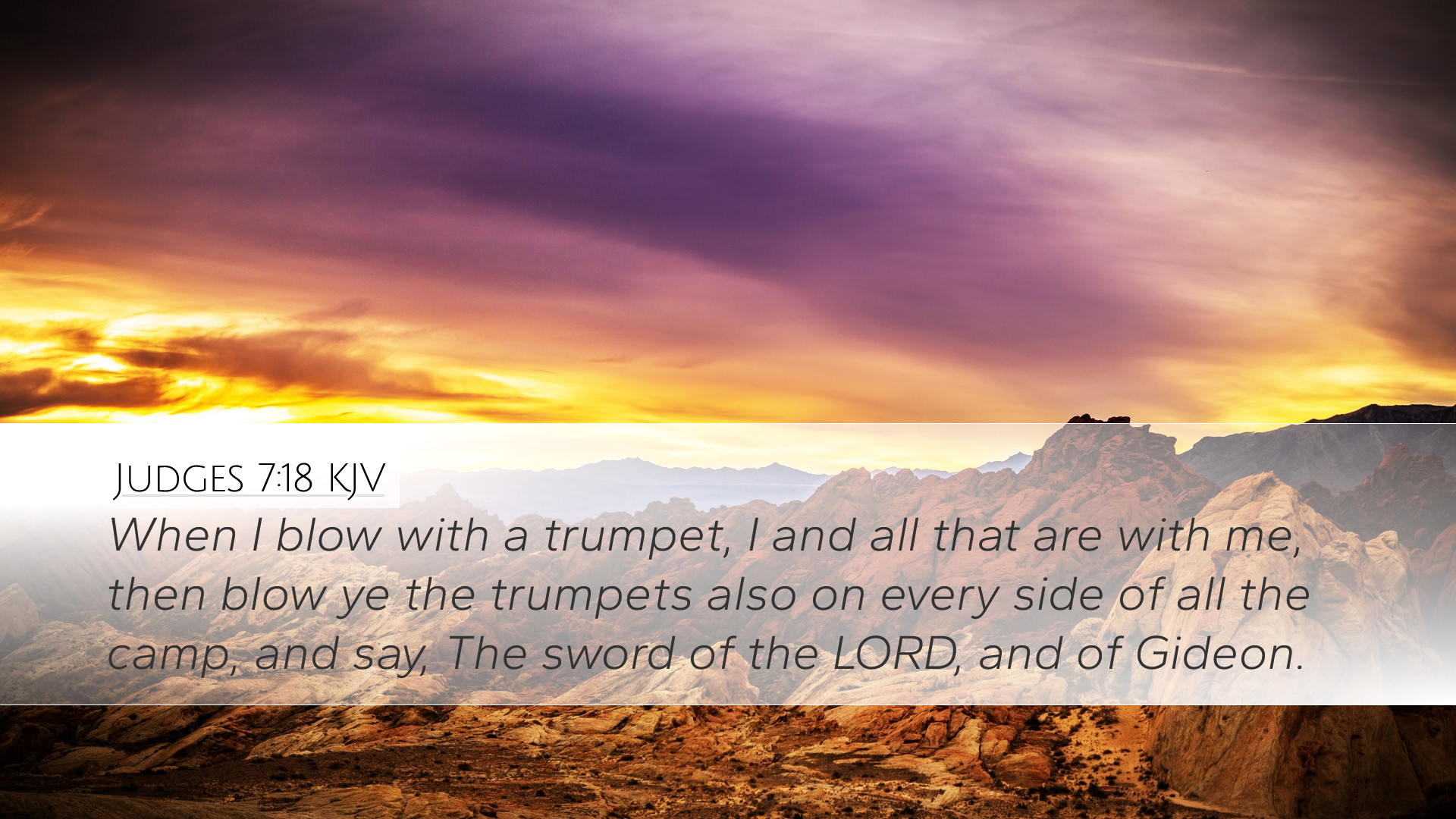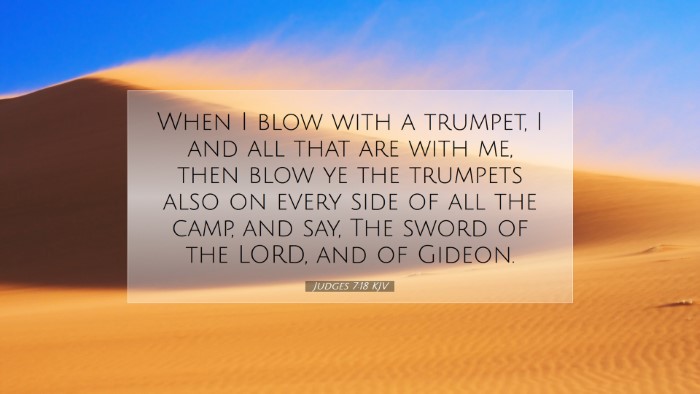Old Testament
Genesis Exodus Leviticus Numbers Deuteronomy Joshua Judges Ruth 1 Samuel 2 Samuel 1 Kings 2 Kings 1 Chronicles 2 Chronicles Ezra Nehemiah Esther Job Psalms Proverbs Ecclesiastes Song of Solomon Isaiah Jeremiah Lamentations Ezekiel Daniel Hosea Joel Amos Obadiah Jonah Micah Nahum Habakkuk Zephaniah Haggai Zechariah MalachiJudges 7:18
Judges 7:18 KJV
When I blow with a trumpet, I and all that are with me, then blow ye the trumpets also on every side of all the camp, and say, The sword of the LORD, and of Gideon.
Judges 7:18 Bible Commentary
Judges 7:18 - Commentary Summary
Verse Text: "When I blow the trumpet, I and all who are with me, then blow the trumpets also on every side of all the camp, and shout, ‘For the Lord and for Gideon!’”
Contextual Background
This verse occurs within the account of Gideon’s campaign against the Midianites. Following a significant reduction in Gideon’s army, God instructs him to use a surprising strategy instead of traditional warfare. The trumpet blast symbolizes a call to arms, signaling unity among Gideon’s soldiers and invoking divine intervention.
Commentary Insights
Matthew Henry's Commentary
Matthew Henry emphasizes the importance of divine instruction in Gideon’s preparation for battle. He notes that the trumpet serves not merely as a call to arms but as a profound declaration of faith. Henry posits that Gideon’s strategic use of sound reflects God’s power over natural means. The act of shouting ‘For the Lord and for Gideon!’ signifies a dual loyalty to God and His chosen leader.
Albert Barnes' Notes
Albert Barnes focuses on the peculiar nature of the battle plan that entails surrounding and confusing the enemy rather than engaging in direct confrontation. Barnes points out that it illustrates God’s method of delivering His people through unconventional means. This approach serves to magnify God's glory, as the victory will not stem from military might but from divine intervention, showing the futility of earthly strength against God’s will.
Adam Clarke's Commentary
Adam Clarke provides a theological reflection on the significance of the trumpet as a symbol in both the Old and New Testaments. He identifies the trumpet as a call to worship, a summons to battle, and a signal for celebration. Clarke correlates the voice of the trumpet to the call of God, indicating that it represents a broader invitation for believers to unite under God’s command in times of distress. He also notes that Gideon’s strategy might remind the faithful that, in their struggles, the acknowledgment of God’s supremacy is crucial.
Theological Implications
This verse underscores several key theological principles:
- Divine Sovereignty: The victory belongs to God, reminding believers that human strategy and strength are secondary to divine intervention.
- Faithfulness in Leadership: Gideon’s leadership is marked by obedience and clarity of purpose, as he directs his army to recognize God in battle.
- Unified Response: The collective action of the Israelites signifies the importance of unity in faith and purpose when moving forward in God’s mission.
Practical Applications
For pastors, students, theologians, and scholars, the implications of this verse yield several practical applications:
- Encouragement in Weakness: It reminds leaders that God often works through our weaknesses, transforming them into opportunities for His glory.
- Strategies of Faith: Engaging in prayer and spiritual readiness before undertaking any significant challenges reflects Gideon's dependence on God's direction.
- Community in Worship: Just as Gideon rallied his men, believers are called to gather in worship and battle against the forces that oppose God’s kingdom.
Conclusion
Judges 7:18 encapsulates significant lessons in faith, leadership, and divine intervention. By studying the layers of meaning within this text, one can appreciate the depth of trust required to follow God’s unconventional methods and the importance of mutual encouragement among believers. The call to action through the trumpet and shout serves both as a historical account and a timeless encouragement to recognize God's sovereignty in all endeavors.


